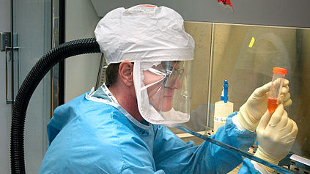 A researcher working in a biosafety level 3-enhanced laboratory setting WIKIMEDIA COMMONS, CDC'S PUBLIC HEALTH IMAGE LIBRARY
A researcher working in a biosafety level 3-enhanced laboratory setting WIKIMEDIA COMMONS, CDC'S PUBLIC HEALTH IMAGE LIBRARY
The Massachusetts Executive Office of Energy and Environmental Affairs last week (December 2) granted preliminary approval for Boston University to open its long awaited and highly controversial biomedical research laboratory, but only for work on less hazardous substances than originally proposed, The Boston Globe reported. In addition, the environmental agency is requiring another round of public comment, starting today (December 7) and lasting 2 two weeks. After that, the agency says it will consider issuing the final approval for the lab to begin biosafety level-2 research, which involves “agents that pose moderate hazards to personnel and the environment,” according to the federal government’s definition.
“BU researchers will focus on Tuberculosis and experiments that have been approved for the [biosafety level-2] laboratories,” the University said in ...




















